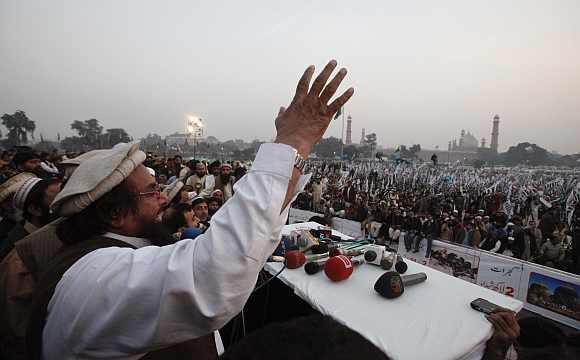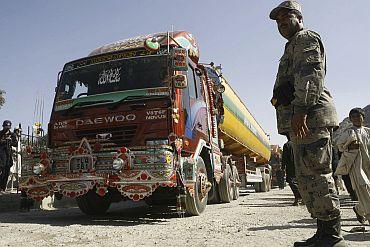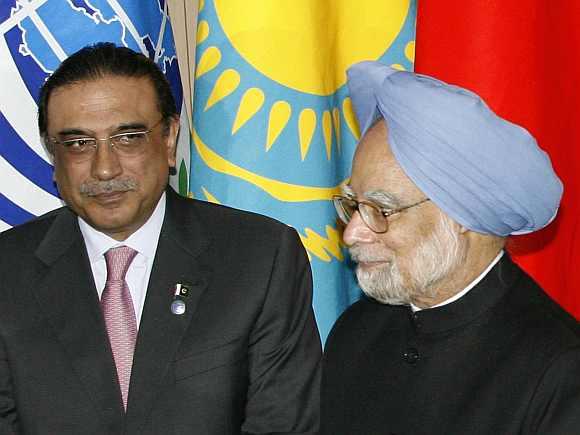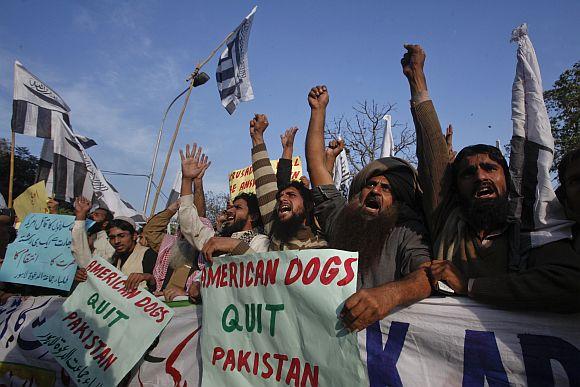
Interior ministry officials in Islamabad say that to act against Hafiz Mohammad Saeed, the government needs actionable evidence. It has also said that a respectable Pakistani national can't be prosecuted on the basis of hearsay and that too just to please India. Amir Mir reports.
The Pakistan government is in no mood to proceed against the Jamaat-ud Dawa chief Hafiz Mohammad Saeed, who, despite being placed by the United States on its most-wanted terrorist list for his involvement in the 26/11 Mumbai terror attacks, has stepped up his anti-US and anti-India public campaign by literally laughing off the American action against him.
The freedom Saeed continues to enjoy in Pakistan even after being declared a most wanted terrorist with a USD 10 million bounty (Rs 52 cr), can be gauged from the fact that the JuD ameer addressed a press conference in the garrison city of Rawalpindi on May 5 and dared the US to carry out a military raid against him like the one that killed Al Qaeda chief Osama bin Laden.
The 62-year-old former professor of Islamic studies at a state run university in Lahore then taunted the Americans to give him the money being offered for him under the Rewards for Justice Programme, adding that he would himself inform them about his whereabouts.
...
For Realtime News on Hafiz Mohammad Saeed, click here

Hafiz Saeed, who makes regular public appearances in Pakistan, mocked the idea of offering a bounty for someone who lives so openly. "Americans seriously lack information. Don't they know where I live and what I do? These rewards are usually announced for people who are hiding in mountains or caves. I wish the Americans would give this reward money to me. I am not hiding in caves and mountains. I am here in Rawalpindi right now. If the US wants to contact me, I am present here, they can contact me. I am also ready to face any American court, or wherever there is proof against me," the JuD chief told reporters.
While condemning the American move against him, Saeed said Washington's decision to announce $10m bounty on him was highly prejudicial, unjustified and reflective of its frustration over a mass campaign against the possible restoration of the NATO supplies being launched by Difa-e-Pakistan Council (DPC), of which his party is a major partner. He said that Washington was just acting on Delhi's cue and the head money announcement was mala fide since it had been India's earnest desire to silence him to counter the vigorous campaign he had been leading against the Indian occupation of Jammu & Kashmir.
As the JuD chief openly goaded the US, the State Department resorted to a damage-control exercise to defend the legitimacy of announcing a bounty on a man who moves freely in Pakistan and openly taunts the US. "We want Saeed to be quickly prosecuted and jailed. He is free, unfortunately, up to this moment. But we hope to put him behind bars," the US State Department spokesman Mark Toner said on April 5.
He sought to clarify the reward for Saeed, saying that Washington was offering money not for his capture but for information that would allow his prosecution in a court in the United States or elsewhere. "We all know where he is - you know, every journalist in Pakistan and in the region knows how to find him -- but we are looking for information that can be usable to convict him in a court of law," Toner said.
...

The American action against Hafiz Saeed came virtually on the eve of Pakistan President Zardari's upcoming meeting with Indian Prime Minister Manmohan Singh, whose government has welcomed the move to bring the perpetrators of Mumbai terror attacks to book. Initial reaction to President Zardari's proposed visit had focused on the scope to improve the visa regime and trade between the two countries. But the focus of the Manmohan-Zardari meeting may now shift back to terrorism, with the Indian government having already asked the Pakistan government to proceed against Saeed in accordance with the international law.
But well placed interior ministry officials in Islamabad say that to act against Hafiz Mohammad Saeed, the Pakistan government needs watertight actionable evidence from the United States that can withstand judicial scrutiny, adding that a respectable Pakistani national can't be prosecuted on the basis of hearsay and that too just to please India. Citing a May 12, 2009, diplomatic cable sent by then US Ambassador to Islamabad Anne Patterson to her bosses in the State Department (on May 12, 2009) about the 26/11 attacks, the interior ministry officials said that the Americans had already rubbished Delhi's case involving the LeT and the ISI's top leadership in the 2008 Mumbai attacks.
Wikileaks quoted Anne Patterson as writing to the US State Department that India had presented insufficient evidence against the Lashkar-e-Tayiba leadership. The leak said, Anne Patterson had (in a wire to the Washington) mentioned that the Pakistani Federal Investigation Agency (FIA) had insufficient evidence for prosecution against senior LeT leaders like Zakiur Rehman Lakhvi, Zarar Shah and Mazhar Iqbal Alqama. Patterson even said that the FIA was forced, as a result of political pressure, to arrest and charge the three LeT leaders and that the FIA was still without solid evidence to begin a formal trial.
...

Therefore, while reacting to the $10 million bounty on Hafiz Saeed, the foreign office spokesman in Islamabad said (on April 5) that the Pakistan government would prefer concrete evidence from the US against Hafiz Mohammad Saeed than to engage in a public debate on the matter.
"In a democratic country like Pakistan, where the judiciary is independent, evidence against anyone must withstand judicial scrutiny," the Foreign Office spokesperson Abdul Basit said in a statement on April 5, while clearly toeing the line of the country's security establishment whose tacit backing has led the LeT/JuD combine become one of the most effective jehadi organisations operating in the Jammu Kashmir and involved in guerilla activities.
The outfit has more than 3,000 offices across Pakistan and dozens of launching camps for the militants along the Line of Control. Compared to other Pakistani jehadi groups, the LeT/JuD has so far proven to be a great success. Since its inception, it has managed to attract thousands of committed young men to its fold. But Pakistan's mighty military and intelligence establishment is clearly reluctant to proceed against the vast jehadi infrastructure of the LeT/JuD combine, thus allowing it to become a global exporter of Islamic terrorism.
...